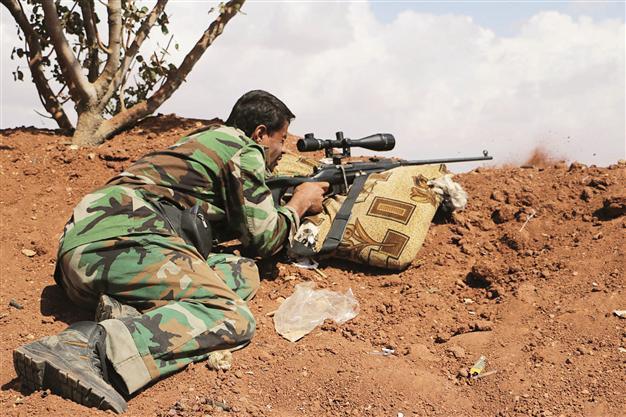Pitched battles between ISIL and Syrian Kurds cause alarm along Turkish border
ŞANLIURFA / ANKARA

A rebel fighter from the Free Syrian Army's Fajr al-Hurriya (Dawn of Freedom) Brigades mans a position during battles with jihadists from the ISIL on a frontline north of the Syrian city of Aleppo on Sept. 25, 2014. AFP PHOTO / BARAA AL-HALABI
Turkish officials detained five Chinese, three Tajiks, a German and a Russian in the Ceylanpınar district of Şanlıurfa Sept. 25 on suspicion of attempting to cross into Syria and join jihadists amid continuing pandemonium on the country’s southern border.The suspects were caught in a field belonging to TİGEM, the state-run agriculture organization. Cameras, flash disks and some other electronic devices were found on them, while sources claimed that they were on their way to join the Islamic State of Iraq and the Levant (ISIL).
Some 43 people, carrying 15 AK-47 rifles and 500 bullets, were captured going in the opposite direction, as they were trying to enter Turkey illegally.
Those detained were reportedly members of the People’s Protection Units (YPG), an extension of the Democratic Union Party’s (PYD), who were escaping from ISIL after the jihadists took over some villages around Kobane.
Kobane is a hot spot across from Şanlıurfa’s Suruç district where the YPG and the outlawed Kurdistan Workers’ Party (PKK) are confronting ISIL.
Some 140,000 people, according to official figures, have fled possible ISIL atrocities following its offensive against the predominately Kurdish town, since Turkey opened its frontier to refugees Sept. 19.
Prime Minister Ahmet Davutoğlu held a meeting on the situation of the refugees and security at the borders with the intelligence chief and the head of the General Staff on Sept. 25.
Turkish security forces have already boosted measures by the border. Mobile teams are trying to control the border 24 hours a day and report on the latest situation, while measures have also been increased at airports to prevent the flow of possible foreign fighters to Syria, with European countries, according to officials, sharing more information with Turkey.
A number of howitzers have been deployed to crucial hills, while soldiers’ sentry boxes in some dangerous spots have been evacuated to avoid any accidental causalities.
Turkish soldiers have found a number of rifles, pistols and bullets at the border over the week, which were presumably left there by fleeing refugees.
ISIL and the YPG continued to fight on Sept. 25 for control of the crucial Zorava Hill, only five kilometers from Kobane. Both sides exchanged fire with heavy guns, Hürriyet reporters observed, with sources saying ISIL would gain a military advantage to eventually take over Kobane if it wrests control of Zorava from the defenders.
Locals in the Sıftık village of Suruç on the Turkish side have been using binoculars to observe the pitched battles.
Although many refugees are still crossing into Turkey, some are returning home, even as the sound of gunfire from Syria could be clearly heard in the morning on Sept. 25.
More than 1,000 Kurdish refugees crossed at Mürşitpınar back to Kobane on Sept. 24, according to one eyewitness.
One such refugee, a woman in her 50s called Halise, told Anadolu Agency the night of Sept. 24 that they were miserable even though their relatives in Turkey were trying to shelter them.
“Even though there is life-threatening danger there, we want to go back,” she said, while waiting in front of the border gate with eight other of her family members.
“We were staying in the same place with nine other families,” said, Selma Şexmuz, a mother of eight. “We don’t have enough money to survive. Life is expensive here. We took shelter in Kobane two years ago after leaving Damascus. We are scared, but we do not have any other option. I have been here for the last six days.”
Mahmoud Osman Ali, 77, said: “We came here in mass panic. They told me ISIL has not reached Kobane. I am going back alone after having sent my daughter and her seven children to Gaziantep [in Turkey].”
Turkey’s Disaster and Emergency Management Authority (AFAD), Health Ministry and Social Services officials, who mostly speak Kurdish, are the first people to welcome the refugees. Şanlıurfa municipality is also expending efforts for hygiene while health officials are vaccinating kids.
AFAD is distributing food and water to refugees after medical exams.
Meanwhile, Mehmet Bekaroğlu, a deputy leader of the main opposition Republican People’s Party (CHP), told Hürriyet Sept. 25 after a visit to the region that only 50,000 people had fled to Turkey, just one-third of the official figure.
The refugees at the borders are living in poor conditions, he said, adding that this was due to a row between officials in Suruç and the mayor from the People’s Democratic Party (HDP). Some tents erected by the official aid bodies remained empty, he said.
This story was compiled from reports by Hürriyet journalists Gülden Aydın, Uğur Ergan, İdris Emen, Uğur Ergan and Fevzi Kızılkoyun.
















